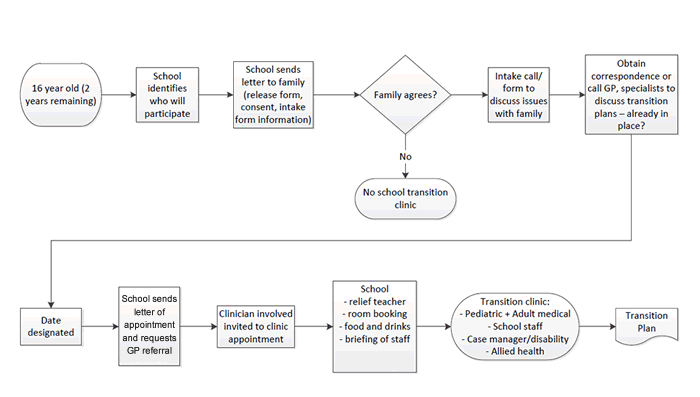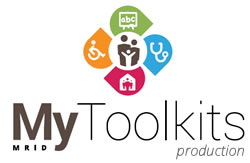The shift from school to adulthood and the shift to post-school life and adult (rather than paediatric) health services is a major transition point in the life of a young person with intellectual disability or complex illness, and their family.
This is a period of significant change that can involve considerable stress and high levels of emotion. A young person and their family may feel anxious and uncertain that the support they have received to date from the education and paediatric health systems will no longer be available. For more about the stresses a family may feel at this time go to the SchoolKit Family Timeline.
What Happens in a SchoolKit Transition Clinic?
A SchoolKit Transition Clinic focuses on the development of a transition plan. This plan can play an invaluable role in facilitating the transition process and empower the young person and their family to proceed confidently.
SchoolKit Transition Clinics are an extension of the SchoolKit Clinic model. All of the same foundation principles, aims and benefits apply, and in general terms the process of arranging, running and following-up after clinics is much the same.
The primary purpose of the clinics is different to a SchoolKit Clinic however and requires a different approach. A ‘whole of life’ approach is used, information on the young person is reviewed and different options are discussed.
In some ways these school-based transition clinics can be seen as a farewell from one group of professionals who provide care and support to a young person and their family, and a hello from the new group who will pick things up from here on. The new group will generally be quite different, but more suited to the young person as an adult.
Secondary School to Post-School Options
Young people with intellectual disability leaving school have a number of different options.
As well as further education or employment in the community, there are a number of government provided programs (for example, the ADHC Transition to Work and Community Participation programs) that are particularly designed for students with disability. Traditionally, Ageing, Disability and Home Care (ADHC) have conducted assessments in conjunction with school staff to determine the level of support that may be required, and the appropriate program that might be offered for a young person. School counsellors, careers advisors and transition teachers, as well as transition coordinators or case managers, may also be involved as advisors.
Holding a SchoolKit Transition Clinic at a young person’s school can be a very useful forum for developing an individualised transition plan. Teachers who have known a young person for a number of years can be an invaluable resource as they know their student’s strengths and weaknesses, and can advise on appropriate post-school options.
Young people with disabilities and their families often have a number of health and medical specialists and services involved in providing care and support who will stop providing services after the paediatric age. Often the transition from paediatric health services (which are child- and family-focused) to adult health services with an individual focus, can be particularly challenging.
Ideally, at a SchoolKit Transition Clinic, the adult physician who will continue to look after the young person and family is present and welcoming. This allows the new doctor to gain the greatest possible understanding of the medical and other issues of the young person. It also gives the young person and family time to meet their new physician, and start to transfer to them the trust and confidence they have developed with the school and paediatric team over many years. In this way the medical aspect of transition can occur smoothly.
Other issues that may need to be addressed for the young person in this transition period are their accommodation (particularly where there is a need for supported accommodation) and respite and carer support requirements. It is also essential to consider the young person’s developing independence away from the home environment and to ensure that they have opportunities for adequate ongoing social interactions and community engagement.
At a SchoolKit Transition Clinic the young person and their parents or carers will be introduced to medical and health service providers they may not previously have been aware of, and their different functions will be explained. The often complicated business of how different health and social service agencies work together and interact will also be explored as necessary.
Every Young Person’s Situation is Unique
SchoolKit Transition Clinics, particularly in the final year of school, are helpful to discuss and prepare a young person and their family for the major changes facing them post-school. They are particularly useful to assess the health care needs of the adolescent, and to introduce them to adult specialist health services and disability service providers.
At all times the unique needs, challenges and aspirations of the young person will shape the strategies developed to help them through their transition to adulthood. SchoolKit Transition Clinics can play a vital role in ensuring that this vulnerable group does not fall between the cracks.
Parents and carers, as well as school staff, who have participated in SchoolKit Transition Clinics have found them very helpful. Read what they had to say about the clinics at Positive Feedback.
The SchoolKit Transition Clinic Process
The SchoolKit Transition Clinic process can be simply illustrated. As for SchoolKit Clinics, confirming consent is essential at every stage, nothing goes ahead without it.
Click the above graphic for enlargement





